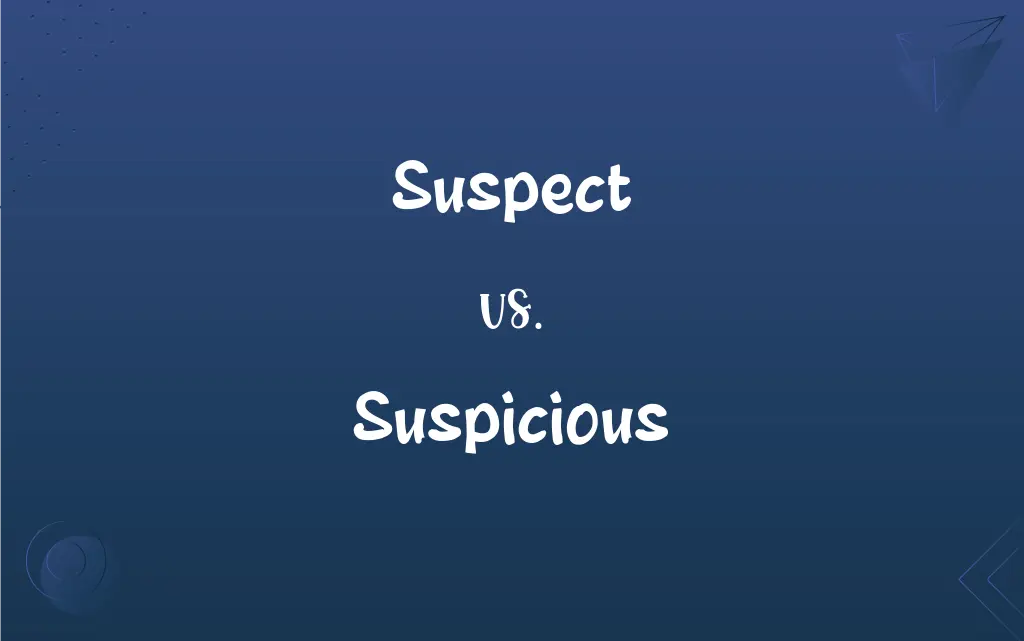Suspect vs. Suspicious: What's the Difference?
Edited by Aimie Carlson || By Janet White || Updated on September 27, 2023
"Suspect" is a noun or verb relating to one believed to have committed a crime; "Suspicious" is an adjective describing a lack of trust or doubtfulness.

Key Differences
"Suspect" and "Suspicious" are terms with distinct grammatical roles and meanings within the English language, each serving to describe differing aspects of doubt, mistrust, or criminal association. "Suspect" can serve as both a noun and a verb, referring to an individual who is believed to have committed a crime or to the act of suspecting someone of something, respectively. On the contrary, "Suspicious" is an adjective and it pertains to the manifestation of suspicion, usually depicting doubt, mistrust, or the appearance of irregularity or abnormality.
Examining "Suspect" more closely, it is evident that when used as a noun, it identifies an individual under suspicion, typically in relation to a crime or wrongdoing. This usage may not imply guilt but indicates that the person is subject to inquiry or investigation. In contrast, "Suspicious" delineates a state or feeling of mistrust or doubt, often prompted by appearances, behaviors, or situations that seem abnormal, irregular, or inconsistent with expectations, allowing it to describe objects, actions, or persons that provoke suspicion.
In its verbal form, "Suspect" means to have doubts or suspicions about something or someone, reflecting a process of thought or a state of mind, allowing for a wider range of applicability, such as suspecting honesty, motives, or truthfulness. However, "Suspicious" universally conveys a state or appearance of doubt or mistrust, making it an appropriate descriptor for situations, behaviors, or appearances that seem questionable, irregular, or out of the ordinary, denoting perceived risk or uncertainty.
Another layer of meaning for "Suspect" emerges when considering its legal context. A suspect is a specific individual believed to have committed a specific crime and is under investigation or arrest, implying a more formal and concrete association with criminal activity. Conversely, "Suspicious" is broader and more subjective, allowing for varied and individual interpretations and perceptions of what appears to be doubtful, unusual, or worthy of mistrust, often serving to justify further scrutiny, investigation, or caution.
Comparison Chart
Part of Speech
Noun, Verb
Adjective
ADVERTISEMENT
Meaning
An individual believed to have committed a crime
Describing a lack of trust or appearance of irregularity
Usage
Identifies an individual or the act of suspecting
Describes objects, actions, or persons that provoke suspicion
Context
Legal, General
General, Various
Association
Concrete, Specific
Broad, Subjective
Suspect and Suspicious Definitions
Suspect
To have doubts about.
I suspect her motives.
ADVERTISEMENT
Suspicious
Having or showing a cautious distrust of someone or something.
He was suspicious of their motives.
Suspect
A person believed to have committed a crime.
The police arrested the suspect without incident.
Suspicious
Causing one to have the idea or impression that something is of questionable, dishonest, or dangerous character or condition.
The suspicious package was reported to the authorities.
Suspect
Doubtful, questionable.
The claim seems suspect to me.
Suspicious
Inclined to suspect, especially inclined to suspect evil.
He has a suspicious nature.
Suspect
To consider (something) to be true or probable on little or no evidence
I suspect they are very disappointed.
Suspicious
Indicative of a lack of trust.
The clerk cast a suspicious glance at the customer.
Suspect
To have doubts about (something); distrust
I suspect his motives.
Suspicious
Arousing or apt to arouse suspicion; questionable
Suspicious behavior.
Suspect
To consider (a person) guilty without proof
The police suspect her of murder.
Suspicious
Tending to suspect; distrustful
A suspicious nature.
Suspect
To have suspicion.
Suspicious
Expressing suspicion
A suspicious look.
Suspect
One who is suspected, especially of having committed a crime.
Suspicious
Arousing suspicion.
His suspicious behaviour brought him to the attention of the police.
Suspect
Open to or viewed with suspicion
A suspect policy.
Suspect motives.
Suspicious
Distrustful or tending to suspect.
I have a suspicious attitude to get-rich-quick schemes.
Suspect
(transitive) To imagine or suppose (something) to be true, or to exist, without proof.
To suspect the presence of disease
Suspicious
Expressing suspicion
She gave me a suspicious look.
Suspect
(transitive) To distrust or have doubts about (something or someone).
To suspect the truth of a story
Suspicious
Inclined to suspect; given or prone to suspicion; apt to imagine without proof.
Nature itself, after it has done an injury, will ever be suspicious; and no man can love the person he suspects.
Many mischievous insects are daily at work to make men of merit suspicious of each other.
Suspect
(transitive) To believe (someone) to be guilty.
I suspect him of being the thief.
Suspicious
Indicating suspicion, mistrust, or fear.
We have a suspicious, fearful, constrained countenance.
Suspect
(intransitive) To have suspicion.
Suspicious
Liable to suspicion; adapted to raise suspicion; giving reason to imagine ill; questionable; as, an author of suspicious innovations; suspicious circumstances.
I spy a black, suspicious, threatening could.
Suspect
To look up to; to respect.
Suspicious
Openly distrustful and unwilling to confide
Suspect
A person who is suspected of something, in particular of committing a crime.
Suspicious
Not as expected;
There was something fishy about the accident
Up to some funny business
Some definitely queer goings-on
A shady deal
Her motives were suspect
Suspicious behavior
Suspect
Viewed with suspicion; suspected.
Suspicious
Tending to arouse suspicion.
His behavior was highly suspicious.
Suspect
(nonstandard) Viewing with suspicion; suspecting.
Suspect
Suspicious; inspiring distrust.
Suspect [was] his face, suspect his word also.
Suspect
Suspected; distrusted.
What I can do or offer is suspect.
Suspect
Suspicion.
So with suspect, with fear and grief, dismayed.
Suspect
One who, or that which, is suspected; an object of suspicion; - formerly applied to persons and things; now, only to persons suspected of crime.
Suspect
To imagine to exist; to have a slight or vague opinion of the existence of, without proof, and often upon weak evidence or no evidence; to mistrust; to surmise; - commonly used regarding something unfavorable, hurtful, or wrong; as, to suspect the presence of disease.
Nothing makes a man suspect much, more than to know little; and therefore men should remedy suspicion by procuring to know more.
From her hand I could suspect no ill.
Suspect
To imagine to be guilty, upon slight evidence, or without proof; as, to suspect one of equivocation.
Suspect
To hold to be uncertain; to doubt; to mistrust; to distruct; as, to suspect the truth of a story.
Suspect
To look up to; to respect.
Suspect
To imagine guilt; to have a suspicion or suspicions; to be suspicious.
If I suspect without cause, why then make sport at me.
Suspect
Someone who is under suspicion
Suspect
A person or institution against whom an action is brought in a court of law; the person being sued or accused
Suspect
Imagine to be the case or true or probable;
I suspect he is a fugitive
I surmised that the butler did it
Suspect
Regard as untrustworthy; regard with suspicion; have no faith or confidence in
Suspect
Hold in suspicion; believe to be guilty;
The U.S. suspected Bin Laden as the mastermind behind the terrorist attacks
Suspect
Not as expected;
There was something fishy about the accident
Up to some funny business
Some definitely queer goings-on
A shady deal
Her motives were suspect
Suspicious behavior
Suspect
To think that (someone) is guilty of a crime or of wrongdoing.
I suspect him of falsifying the records.
Suspect
To regard as probable; to imagine to be true.
I suspect she is unhappy.
FAQs
Is "Suspicious" used to describe appearances or behaviors?
Yes, "Suspicious" describes objects, actions, or persons that seem questionable or provoke suspicion.
Does "Suspect" as a verb mean to have doubts?
Yes, "Suspect" as a verb means to have doubts or suspicions about someone or something.
Is "Suspect" commonly used in legal contexts?
Yes, "Suspect" is commonly used to refer to individuals under investigation or arrest in legal contexts.
Can "Suspicious" be subjective and vary between individuals?
Yes, "Suspicious" is subjective and can vary based on individual perceptions and interpretations.
Are "Suspect" and "Suspicious" synonymous?
No, "Suspect" can be a noun or verb, and "Suspicious" is an adjective describing doubt or mistrust.
Can "Suspicious" relate to perceived risk?
Yes, "Suspicious" often denotes perceived risk or uncertainty.
Can "Suspect" be used to identify an individual?
Yes, "Suspect" as a noun refers to an individual believed to have committed a crime.
Can "Suspicious" justify further investigation or caution?
Yes, "Suspicious" appearances or behaviors often justify further scrutiny or caution.
Does "Suspicious" imply a level of awareness and attentiveness to details?
Yes, being "Suspicious" often implies a heightened level of awareness and attentiveness to potential risks or anomalies.
Does "Suspect" always imply guilt?
No, a "Suspect" is under suspicion but is not proven guilty.
Can situations be described as "Suspicious"?
Yes, situations, as well as behaviors and appearances, can be described as "Suspicious".
Is "Suspect" applicable in general and various contexts outside of legal ones?
Yes, "Suspect" can be used in various contexts to mean having doubts or suspicions about someone or something.
Is "Suspicious" broad in its applicability?
Yes, "Suspicious" is broad and can describe anything appearing to be of questionable nature or arousing distrust.
Does "Suspect" have a more specific association compared to "Suspicious"?
Yes, "Suspect" often has a more specific and concrete association, especially in legal contexts, compared to the broad and subjective "Suspicious".
Can "Suspect" refer to the act of suspecting?
Yes, "Suspect" as a verb refers to the act of having doubts or suspicions about something or someone.
About Author
Written by
Janet WhiteJanet White has been an esteemed writer and blogger for Difference Wiki. Holding a Master's degree in Science and Medical Journalism from the prestigious Boston University, she has consistently demonstrated her expertise and passion for her field. When she's not immersed in her work, Janet relishes her time exercising, delving into a good book, and cherishing moments with friends and family.
Edited by
Aimie CarlsonAimie Carlson, holding a master's degree in English literature, is a fervent English language enthusiast. She lends her writing talents to Difference Wiki, a prominent website that specializes in comparisons, offering readers insightful analyses that both captivate and inform.































































